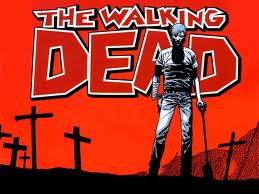 Steven J. Moss writes for The Potrero View, a tiny independent community publication that has seen distribution in the San Francisco Bay Area for more than 40 years. As with any news and opinion publication, it enjoys the protection of the First Amendment. This makes Moss’s March column calling for the censorship of entertainment media — a column he wrote after admittedly and intentionally going on a binge of all things The Walking Dead — all the more appalling.
Steven J. Moss writes for The Potrero View, a tiny independent community publication that has seen distribution in the San Francisco Bay Area for more than 40 years. As with any news and opinion publication, it enjoys the protection of the First Amendment. This makes Moss’s March column calling for the censorship of entertainment media — a column he wrote after admittedly and intentionally going on a binge of all things The Walking Dead — all the more appalling.
Moss’s gateway drug to The Walking Dead was the AMC television series. After his first hit, Moss soon found himself devouring the comic book series — which he calls “death pornography” — and the novels. His description of the impact of the series almost reads like a recovering drug addict’s manifesto:
I can’t easily explain why I was attracted to this gloomy entertainment. But I do know that the gory consumption binge impacted me emotionally. Like the fictional characters I was following on pages and screens, I became more fearful, distrustful, and morose. I worried that the rustling of the wind indicated an unpleasant surprise in the attic, or that a door was closed for a morbid reason. Three inches into the zombie compilation I felt like I was changing my brain chemistry, with a heightened sense of paranoia that mimicked what might happen after too many hits of the wrong kind of marijuana. Even as I recognized what the zombies were doing to me I kept at until, until, my mind bloated, I finished the last comic book.
Moss then becomes evangelical in his recovery from his The Walking Dead addiction, professing an anecdotal (read: emotionally driven and scientifically unfounded) belief that gory media like The Walking Dead must have a negative impact on our collective psyche:
I’m recovering from all that now, but the episode got me wondering how what we watch or read impacts us. We’ve long attached warning labels to shows and movies that have violent or sexual scenes. We used to censor or ban provocative books. Recent attempts have been made to regulate rap music and video games, lest they incite youth to aggressive acts. Liberals, libertarians, and secular intellectuals have typically dismissed such efforts as liberty-stifling government over-reach. Up until now I’d have agreed with them. But my immersion into the zombie milieu has prompted me to reconsider.
It is those last few sentences that are so horrifying (even more so than The Walking Dead itself). How can a man who enjoys journalistic pursuits and the subsequent protection of the First Amendment then advocate for censorship?
Moss willingly walked into the arms of The Walking Dead, and by his own account, he didn’t do so in a particularly healthy manner. Moss closes his article with the following, revealing the fine point that he is missing in his zeal:
While we can’t always choose where we live, we can determine what we look at, and how we see it. Otherwise, we’re just walking around like zombies.
Moss is completely correct on this one point: We can determine what we look at, and we can choose how we see it. But this is absolutely an individual right — no one else has the right to make these determinations for us. When we stop protecting all speech, even the speech we don’t particularly care for (such as Moss’s column), we become the zombies to which Moss alludes. In acting as a mouthpiece for censorship, Moss in patient zero — the zombie that infects us all.
Please help support CBLDF’s important First Amendment work and reporting on issues such as this by making a donation or becoming a member of the CBLDF!
Betsy Gomez is the Web Editor for CBLDF.